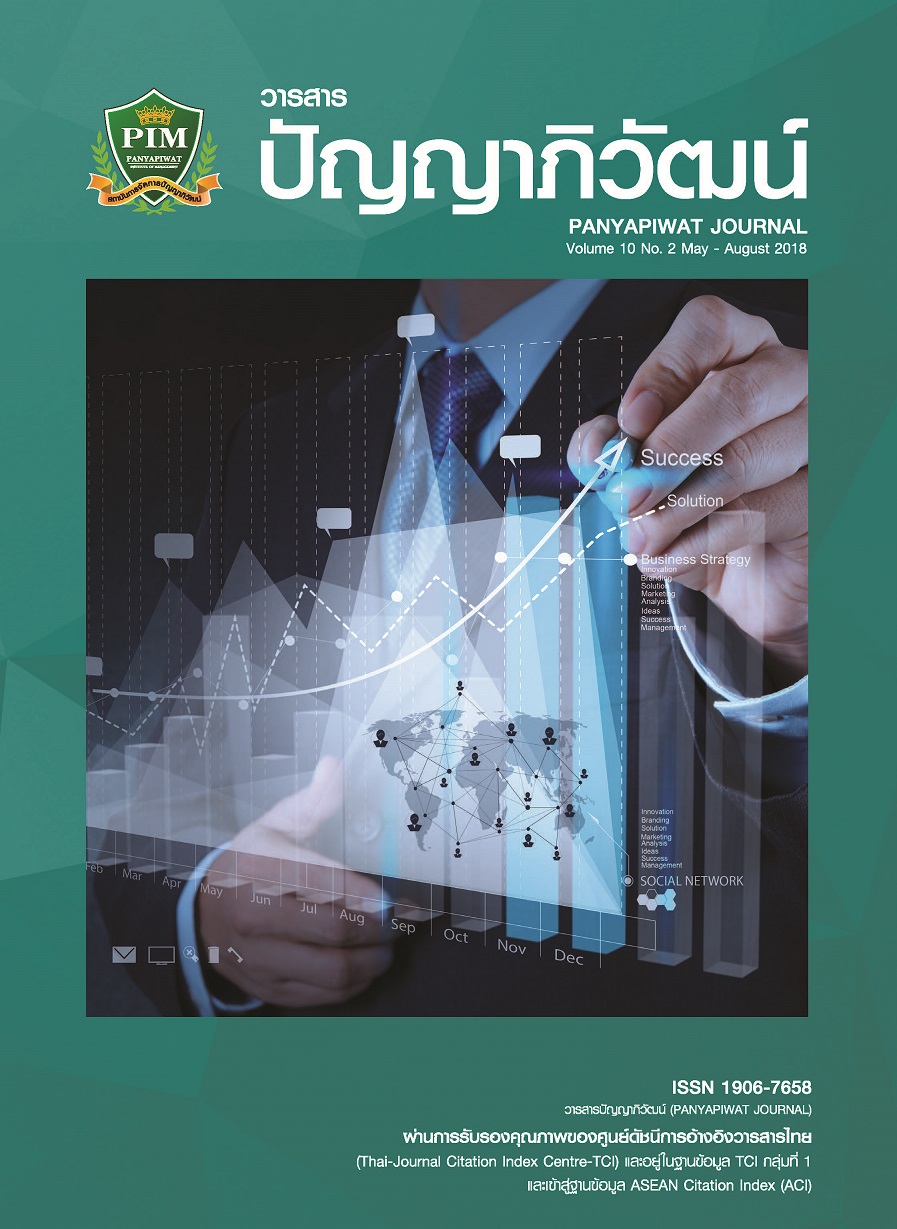การจัดการความรู้เพื่อพัฒนาทักษะชีวิตตามหลักปรัชญาของเศรษฐกิจพอเพียง
Main Article Content
บทคัดย่อ
การวิจัยนี้มีวัตถุประสงค์เพื่อพัฒนาทักษะชีวิตและพฤติกรรมของผู้เรียนระดับอุดมศึกษา โดยใช้กระบวนการจัดการความรู้ตามหลักปรัชญาของเศรษฐกิจพอเพียง กลุ่มตัวอย่างที่ศึกษาจำนวน 20 คน สังเกตพฤติกรรมการจัดการความรู้ ด้วยการสนทนากลุ่มย่อย จำนวน 10 คน โดยสมัครใจ พบว่ากลุ่มตัวอย่างมีทักษะชีวิตตามองค์ประกอบทั้ง 4 ข้อ อยู่ในระดับสูง (X = 4.27) โดยมีองค์ประกอบการตระหนักรู้ และเห็นคุณค่าในตนเองค่าเฉลี่ยสูงมากที่สุด (X = 4.32) เมื่อเรียนรู้ตามหลักปรัชญาของเศรษฐกิจพอเพียงจากผู้นำชุมชน บุคคลต้นแบบพบว่า มีการสร้างมนุษยสัมพันธ์ที่ดีกับผู้อื่น มีค่าเฉลี่ยสูงมากที่สุด (X = 4.56) เข้าใจถึงการดำเนินชีวิตตามหลักปรัชญาของเศรษฐกิจพอเพียง มีพฤติกรรมการรับรู้ และถ่ายทอดความรู้ให้แก่ผู้อื่น กลุ่มตัวอย่างทั้ง 10 คน มีพฤติกรรมอ่อนน้อมต่อผู้ใหญ่และมีความสัมพันธ์กับผู้อื่นได้เป็นอย่างดี
Article Details
“ข้าพเจ้าและผู้เขียนร่วม (ถ้ามี) ขอรับรองว่า บทความที่เสนอมานี้ยังไม่เคยได้รับการตีพิมพ์และไม่ได้อยู่ระหว่างกระบวนการพิจารณาลงตีพิมพ์ในวารสารหรือแหล่งเผยแพร่อื่นใด ข้าพเจ้าและผู้เขียนร่วมยอมรับหลักเกณฑ์การพิจารณาต้นฉบับ ทั้งยินยอมให้กองบรรณาธิการมีสิทธิ์พิจารณาและตรวจแก้ต้นฉบับได้ตามที่เห็นสมควร พร้อมนี้ขอมอบลิขสิทธิ์บทความที่ได้รับการตีพิมพ์ให้แก่สถาบันการจัดการปัญญาภิวัฒน์หากมีการฟ้องร้องเรื่องการละเมิดลิขสิทธิ์เกี่ยวกับภาพ กราฟ ข้อความส่วนใดส่วนหนึ่งและ/หรือข้อคิดเห็นที่ปรากฏในบทความข้าพเจ้าและผู้เขียนร่วมยินยอมรับผิดชอบแต่เพียงฝ่ายเดียว”
References
Aiewsriwong, N. (2011). Cultural Dimension in Sufficient Economy Era Meaning and Importance of Literature Reviews Involving in Sufficient Economy Philosophy. Bangkok: Phet Rung Publisher. [in Thai]
Chalermtong, C. (2017). The Six Practice Guidelines of Teaching and Learning in Higher Education According to the Philosophy of Sufficiency Economy. Panyapiwat Journal, 9(2), 273-274. [in Thai]
Department of Education. (2000). Series of Handouts on Learner-Centered Teaching Process: Integration. Bangkok: Office of Curriculum Development. [in Thai]
Kaewpathima, T. (2014). The Development of Life Skills Test for Students in Grade 4-6. Master of Education’s Thesis, Kasetsart University. [in Thai]
Keam-Kunalai, P., Boonyaphitak, S. & Kongsom, A. (2014). Knowledge Management from classrooms to Community: Integration between Sufficient Economy Philosophy and Local Knowledge to develop Youth’s thinking Abilities. Research report, Thaksin University. [in Thai]
Keawkangwan, S. (2015). Development Psychology in All Age Range. Bangkok: Kasetsart University Press. [in Thai]
Office of the Education Commission Office of Education Council, Ministry of Education. (2009). Overall Operation Report on Nine Year of Educational Reform (2011–2015). Bangkok: V.T.C. Communication. [in Thai]
Office of the Higher Education Commission, Ministry of Education. (2008).Higher Educational 15 Year Plan Framework. Bangkok: Chulalongkorn University Press. [in Thai]
Panit, W. (1997). Research Management: Second Edition Amended Version. Bangkok: D. K. Editions. [in Thai]
_________.(2013). Building Learning Patterns to 21st Century Skills. Bangkok: S Charoen Printing. [in Thai]
Phra Brahmagunabhorn. (2013).General Education for Human Development.Bangkok:Dhamma-Intrend Press. [in Thai]
Piempongsan, P. (2006). Building Driven Process to Sufficient Economy. Journal of Humanities and Social Sciences Burapha University, 14(22), 131-146. [in Thai]
Ponsarum, P. (2011).Higher Educational Reform: The development of learning Process in Bachelor Degree Program.Bangkok: Ministry of University Affairs.[in Thai]
Sante, S. (2011). The Development of Assessment Tools form Learning Activities in Middle Childhood.Master of Education’s Thesis, Khon Kaen University. [in Thai]
Sinlarat, P. & Suwanwong, P. (2011). Directions of Higher Educational Reform in 21st Century. Bangkok: T. P. Print. [in Thai]
Spielmann, S. (2014). Crime: The problems that should be resolved in current society (2nd ed.). Bangkok: Thai Watana Panich. [in Thai]
The National Education Commission. (2002). National Education Act B.E.2542 and Amended Act (2nd ed.). Bangkok: Prik Wan Graphic. [in Thai]
Udomdhammanuparp, M., Phasertsom, R. & Srithong, R. (2011). Human Behaviors and Self Development (5th ed.). Bangkok: Suan Dusit Rajabhat Institute Press. [in Thai]
Wanichritta, T. (2007). Knowledge management in community: a case study of ecotourism management by participation of the community, samut Songkhram province. Master of Education’s Thesis, Khon Kaen University. [in Thai]
Wongpiromsanthi, Y. (2007). Life Skills. Bangkok: I. S. Printing House. [in Thai]

